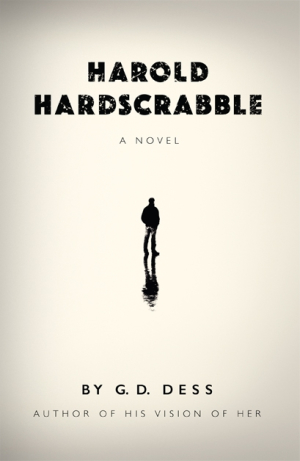Harold Hardscrabble
Harold Hardscrabble is a sympathetic novel filled with philosophical musings on the state of society and our place within it.
G. D. Dess’s Harold Hardscrabble has the feel of a postmodern bildungsroman, though it gradually evolves into something far more Kafkaesque. Harold’s attempts to find his place in society open a world of intellectual and metaphysical thought.
The story follows Harold from his time as an undergraduate into his fifties. He begins as an introverted college student who enjoys reading and formulating complex, unanswerable questions. He falls in love with Carol, who is more extroverted and structured. They begin a life together as expected—getting married and pursuing grad school with an eye toward lucrative careers.
But those pursuits lead to Harold’s existential crisis, which is the focus of the rest of the book. Living life according to societal expectations brings about more and more internal struggle for Harold, who takes moral umbrage with his career, especially when he comes to realize that Carol thrives where he seems to flounder. His inner dramas begin to seep into his outer world, where Harold must deal with them rather than musing over them at length.
The overlapping of Harold’s inner and outer struggles introduces the Kafkaesque tinge to the novel, especially with his repeated dilemmas with unrepentant and unresponsive corporate and government powers. Here, the idea that modern life stymies and damages the soul hits its fever pitch.
The novel is filled with interesting and thought-provoking concepts and critiques on modern life, though it sometimes reads less like a story than a treatise on the value of an intellectual, counterculture lifestyle. There is much discussion on the mental degradation of contemporary youth, but Harold’s complaints against video games and the Internet feel underdeveloped and moderately out of place against the bigger picture of the story—especially since the main people he critiques in this regard are his own children who, despite being avid gamers and social media users, grow into successful and well-adjusted people.
Harold is critical of other characters in book. Side characters seem to exist in Harold’s perspective as overemphasized, personified flaws. There is little change or development to those in such peripheral roles. Harold himself is better realized; if he does not evolve per se, his stagnation is realistically rendered.
Harold Hardscrabble is a sympathetic novel filled with philosophical musings on the state of society and our place within it, on balancing intellectualism with everyday success, and on overcoming the sense of simply being a cog in the machine.
Reviewed by
Shana Creaney
Disclosure: This article is not an endorsement, but a review. The publisher of this book provided free copies of the book and paid a small fee to have their book reviewed by a professional reviewer. Foreword Reviews and Clarion Reviews make no guarantee that the publisher will receive a positive review. Foreword Magazine, Inc. is disclosing this in accordance with the Federal Trade Commission’s 16 CFR, Part 255.

